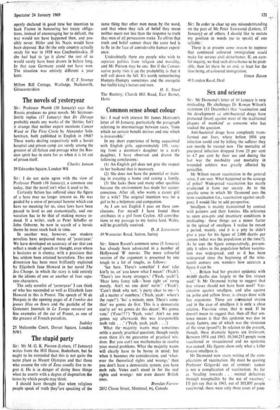Sir: I do not quite agree with the view of
Professor Plumb (10 January), a common one today, that the novel isn't what it used to be.
Certainly fiction has suffered since the figure of a hero may no longer interest us. He was guided by a sense of personal honour which can have no meaning for us, since laws have been passed to level us out economically, and our vocation has to be that of making money in- stead. If a writer, such as Peter Schaffer or John Osborne, be now in search of a heroic theme he must reach back in time.
In another way, however, our modern novelists have surpassed many of 'yesteryear.' We have developed an accuracy of ear that can reflect a mode of speech or thought, even where it hesitates or is clumsy, with a precision that has seldom been attained heretofore. This new dimension has been most brilliantly exploited by Elizabeth Jane Howard in her novel The Sea Change, in which the story is told entirely in the idioms of one or another of four sepa- rate characters.
The only novelist of 'yesteryear' I can think
of who has succeeded so well as Elizabeth Jane, Howard in this is Proust. The speech of M de Norpois in the opening pages of A l'ombre des
jeunes Mies en fleurs and the pastiche of the Goncourt Journals in Le Temps retrouve are fine examples of the ear of Proust, as one of the greatest of French parodists.
Sudeley
25 Melcombe Court, Dorset Square, London NW I


































 Previous page
Previous page